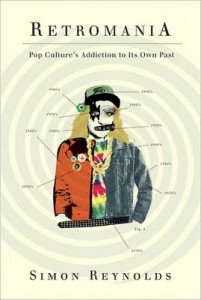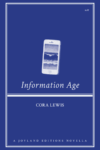 In the introduction to Retromania: Pop Culture’s Addiction to Its Own Past, Simon Reynolds qualifies “past.” He defines “retromania” — a word he possibly made up but definitely made his own — as pop culture’s addiction with the recent past, the remembered past. Also, “retromania” only takes over a creative culture when both creators and consumers, but especially creators, can easily access that recent, remembered past. Reynolds is writing about music, primarily, so he takes the implications of his statement as moot: not only do the creators have access, but they have the reasonable ability to consume all or most of the media they have access to. That’s why Reynolds’ “retromania” will probably never get in bed with book-writing; books take too long to read.
In the introduction to Retromania: Pop Culture’s Addiction to Its Own Past, Simon Reynolds qualifies “past.” He defines “retromania” — a word he possibly made up but definitely made his own — as pop culture’s addiction with the recent past, the remembered past. Also, “retromania” only takes over a creative culture when both creators and consumers, but especially creators, can easily access that recent, remembered past. Reynolds is writing about music, primarily, so he takes the implications of his statement as moot: not only do the creators have access, but they have the reasonable ability to consume all or most of the media they have access to. That’s why Reynolds’ “retromania” will probably never get in bed with book-writing; books take too long to read.
Last year, I read 21 books — a career best for me. Even in college when I was supposed to do nothing but read books and write short stories, I usually topped out at 19 or 20. In the two weeks since 2012 began, I’ve added more books to my to-read list than I will read this year.
Here is an incomplete list of writers who are talked about regularly whose books and other various works I’ve never read: Jonathan Franzen, Jonathan Safran Foer, Joan Didion, David Mitchell, Philip Roth (actually, I’ve read half of Plot Against America, but I can’t remember it), William Gibson, Lionel Shriver, Ursula K. Le Guin, Herman Melville, Henry James, James Joyce, and Carson McCullers. I’ve only read a short story or two by Flannery O’Connor and Raymond Carver. I read my first Margaret Atwood and Jeffrey Eugenides books last month.
Despite being more of a “book person” than a “music person,” most of the time when I read music criticism, or essays about music, I’ve heard all or most of the bands mentioned. To be a music fan is to be on top of things; to be a reader of books is to be perpetually behind. When consuming media, time is relative; geologic time is something very different from the time it takes to back up the hard drive of my laptop, but both of them seem to take forever.
Most people I know still read books in their physical form — even people who have ereaders do, at least some of the time. When most people consume most of their books digitally, whether this comes to pass 10 or 50 or 100 years from now (probably 10-15 years), will the paradigm shift? With the dominance of ebooks, will people read books faster? Will writers begin to indulge in Reynold’s version of “retromania”?
I was planning to start this blog post by mentioning that I’ve finally started reading Retromania after months of planning to read it, but it is better to end there. If I were writing about an album, this piece would feel woefully late. Retromania was published last July, eons in music listening time. While six months past publication date is late for a straightforward review, it’s still well within the acceptable amount of time to be reading and commenting on a new work.
This post may contain affiliate links.







